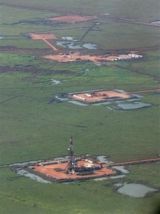Japan studies effect of possible Sudan crude oil ban
November 16, 2007 (TOKYO) — Japan’s trade ministry is studying the effect of a possible ban on Sudan oil imports, anticipating increased public pressure to halt trade with the African nation because of concern about human rights abuses in Darfur, officials said.
 The world’s second-largest oil importer would become the first nation to take such a step. Japan’s trade ministry had hearings with refiners and utilities including Nippon Oil Corp., Japan Energy Corp. and Tokyo Electric Power Co. to probe the consequences of a halt, ministry and company officials said, asking not to be identified before the policy is decided.
The world’s second-largest oil importer would become the first nation to take such a step. Japan’s trade ministry had hearings with refiners and utilities including Nippon Oil Corp., Japan Energy Corp. and Tokyo Electric Power Co. to probe the consequences of a halt, ministry and company officials said, asking not to be identified before the policy is decided.
Human rights groups have sought to end investment and trade with Sudan, accused by the U.S. of supporting genocide in the western Darfur region. Sudan’s Nile Blend crude is valued as a cheaper alternative to low-sulfur fuel oil and among the two most popular crude grades burned by Japanese utilities. Imports gained almost 10-fold last year to cope with rising power use.
“We all are scrambling for the world’s limited supply of oil that can be used for burning at thermal power plants,” Nippon Oil Chairman Fumiaki Watari told reporters in Tokyo today. “We would have to follow the government’s advice, if any, and any diplomatic issues should be discussed among the state governments.”
The government officials said Japan has yet to consider a ban on oil imports from Sudan, while looking into the possibility. A 4 1/2-year civil war in Darfur has claimed the lives of 200,000 people and forced 2.2 million more to flee their homes.
MINAS CRUDE
Japan started importing Nile Blend oil in 2000 to make up for falling shipments of Indonesia’s Minas crude. Production of Minas has been declining as the field ages.
“I’m very sorry to hear that Japan is cutting oil imports from Sudan, if that’s true,” said Hamza Bwau, deputy head at Sudan’s embassy in Tokyo. “But I believe the situation in Sudan will be resolved peacefully in the next few years.”
Japan’s Nile Blend crude imports increased to 6.28 million kiloliters (39.5 million barrels) in 2006 from 636,345 kiloliters in 2000, according to data compiled by the trade ministry. Minas crude imports fell 78 percent to 3.18 million kiloliters last year from 14.6 million kiloliters in 1976, the data show.
The 10 regional power utilities in the world’s second- biggest economy burned 1.62 million kiloliters of Nile Blend in the year ended March 31, or 27 percent of their total. The oil has 0.045 percent sulfur, according to the International Crude Oil Market Handbook published in 2006 by Energy Intelligence Group. Some of Tokyo Electric Power’s facilities limit sulfur in fuel oil to a maximum 0.1 percent.
TOKYO HEARINGS
The hearings in Tokyo with refiners and utilities were led by the trade ministry’s agency for natural resources and energy, the officials said.
Kansai Electric Power Co., Japan’s second-biggest generator, and Kyushu Electric Power Co. will cut crude oil imports from Sudan because of concern the revenue may be used to fund military action in Darfur, officials said Nov. 12.
Kansai Electric has started reducing Nile Blend purchases, spokesman Ryuichi Suehiro said. Kyushu Electric has asked Nippon Oil Corp. and other oil wholesalers to seek alternative varieties, spokeswoman Kyoko Mukasa said.
Officials at seven of the other 10 regional power utilities said they plan to maintain purchases of Nile Blend for now because the crude is vital to run their power plants. The eighth, Okinawa Electric Power Co., doesn’t burn crude oil.
NUCLEAR REACTOR
Tokyo Electric increased oil and gas use after a July 16 earthquake shut Kashiwazaki Kariwa, the world’s biggest nuclear power station, in Japan’s northern prefecture of Niigata. The utility burned 120,000 kiloliters of Nile Blend in the year ended March 31, or 10 percent of its 1.2 million kiloliters (7.5 million barrels) of crude used in the year ended March 31.
“The supply of alternative oil is limited,” said Jun Oshima, a spokesman for Tokyo Electric, the country’s largest power utility. “We have no plans to reduce or halt purchases of the Sudanese oil,” Tokyo Electric’s Oshima said.
Watari of Nippon Oil said crude varieties for direct- burning at thermal power plants include China’s Daqing grade, crude from Vietnam, and oil produced in Russia’s Sakhalin Island.
(Bloomberg)
